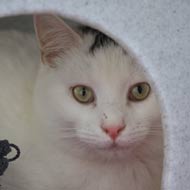'Compassion' needed to tackle cat overcrowding

Casper was from a multi-cat household (Image courtesy of Yorkshire Cat Rescue).
A cat charity is calling for a 'compassionate' approach to households with out-of-control cat populations, as often the owners are afraid to ask for the help they desperately need.
Yorkshire Cat Rescue is also urging housing associations to step in and help with financial contributions to the problem. This follows two recent cases where the charity rescued 29 cats from two homes.
In the first case, the owner had initially taken in a single pregnant stray, but before long she had an unmanageable 10-cat household.
Three pregnant females suffering from a number of illnesses were removed from the house. One had to be put to sleep, while inherent inbreeding sadly led to the deaths of several of the kittens.
“This was not a case of deliberate neglect but one where a single act of kindness became the foundation of an unmanageable situation," said centre manager Sam Davies.
"The owner was clearly aware that there was an issue, but feared she might be evicted if the housing association discovered the scale of the problem."
According to Sam, this is the result of a culture that doles out blame quicker than help and support.
“People who collect cats usually start by opening their home to one or two abandoned animals in an act of kindness."
Unless cats are neutered at a young age they will breed out of control, often resulting in large groups of sick, stressed cats. "Blame is then pointed at the owner who is often desperate for help but afraid to ask for it," Sam added.
Often people want to report owners for neglect and abuse when they hear of cats kept in squalid, overcrowded conditions. However, Yorkshire Cat Rescue wants to offer a compassionate approach. "We are showing people the same kindness that they once offered to an animal in need," Sam explained.
In a separate case, another lady had rescued two kittens (brother and sister) she found dumped in a box. Two kittens quickly became 19 - all of which looked exactly the same. Many of the kittens removed from the house sadly didn't survive, leaving a "mark of sadness" on all those who worked hard to save them.
Rescuing the 29 cats and kittens has cost the charity thousands of pounds, factoring in vet bills for neutering, flea treating, worming and vaccinating the surviving animals.
The charity's founder Sara Atkinson wants housing associations to provide formalised financial support. She is also proposing a collaboration with other charities and the implementation of volunteer welfare and neutering ambassadors.



 The placement will explore how veterinary medicines are authorised.
The placement will explore how veterinary medicines are authorised.